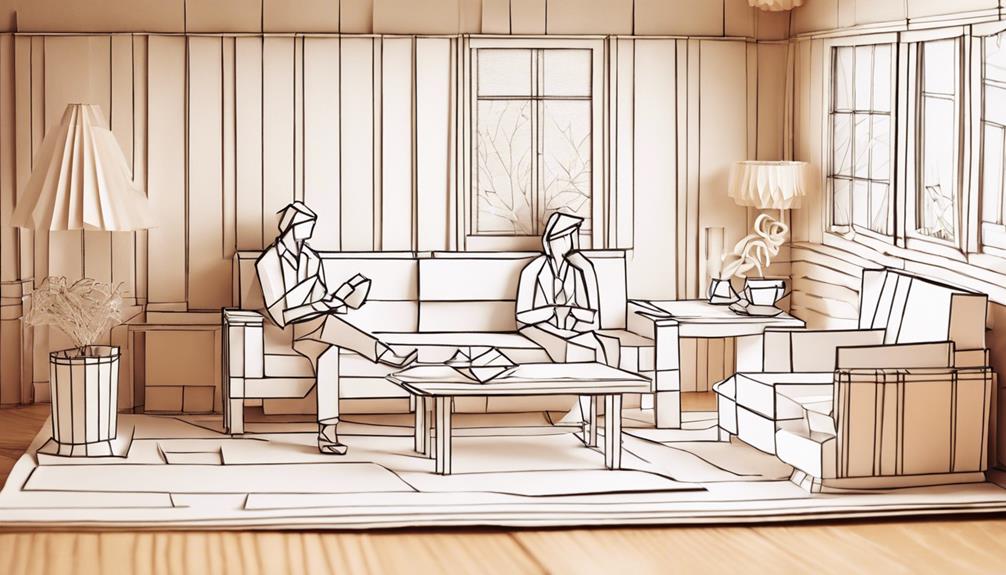Romantic Relationships
The Role of Forgiveness in Communication and Romantic Relationships
Overcoming past grievances through forgiveness can transform romantic relationships, fostering deeper connections and reducing misunderstandings—discover how this powerful act can change your love life.

Forgiveness **makes a huge difference** in how we talk and love. Letting go of grudges **builds healthier bonds** and opens up room for trust and empathy. **Forgiving** allows us to heal, ditch bad vibes, and connect deeply. This act **strengthens emotional ties**, encourages open chats, and cuts down on mix-ups. Together, we can create a cozy space where **vulnerability and trust** bloom, leading to strength and happiness. Embracing forgiveness **helps us form lasting, loving relationships**, guiding us to understand each other better.
This is great for anyone aiming to build **strong** and **lasting romantic relationships**.
Key Takeaways
- Forgiveness facilitates open and honest communication, reducing misunderstandings.
- Letting go of past grievances fosters healthier and more resilient relationships.
- Empathy and trust are reinforced through the practice of forgiveness.
- Releasing resentment creates a safe space for deeper emotional connections.
- Forgiveness helps rebuild trust and encourages vulnerability in romantic relationships.
Understanding Forgiveness

Understanding forgiveness means recognizing the importance of letting go of past grievances to foster a healthier and more empathetic relationship. When we embrace forgiveness in our communication, especially in romantic relationships, we enable a space for understanding and emotional well-being. It's not just about saying 'I forgive you' but genuinely letting go of the hurt and resentment that might otherwise poison our interactions.
Effective communication is the backbone of any relationship, and forgiveness plays a pivotal role in making that communication successful. When we forgive, we pave the way for open and honest dialogue, which is essential for conflict resolution. Holding onto past grievances can create barriers, making it difficult to truly connect with our partners. Letting go allows us to rebuild trust and cultivate empathy, both of which are essential for a strong and healthy bond.
Moreover, forgiveness helps reduce conflict and promotes emotional well-being by eliminating the negative emotions that can linger and cause harm. It's about understanding our partner's perspective and showing empathy, which in turn strengthens the relationship and fosters greater intimacy.
Empathy and Trust

Empathy and trust form the cornerstone of effective communication and a resilient romantic relationship. When we truly grasp our partner's feelings and perspectives, we create a deep connection that fosters a sense of security and openness.
This empathetic communication allows us to be vulnerable, understanding that our honesty will be met with support and understanding.
Trust, on the other hand, is built through consistent actions and honest dialogue. It's about showing up for each other, listening empathetically, and providing consistent support.
When we're confident in our partner, our relationship becomes a safe haven where vulnerability isn't just allowed but encouraged. This kind of trust takes time to develop but is essential for a lasting, healthy relationship.
Conflict Resolution

When we face conflicts in our romantic relationships, understanding each other's perspective becomes essential, allowing us to build empathy and reduce misunderstandings.
By practicing active listening, we show our partners that their feelings matter, which in turn fosters a more supportive environment.
Additionally, managing our emotions effectively helps us stay calm and focused during disagreements, making it easier to resolve issues with love and respect.
Understanding Each Perspective
In conflict resolution, we need to actively listen and empathize with our partner's perspective to truly understand their feelings and motivations. Effective communication hinges on our ability to set aside personal biases and assumptions, allowing us to grasp the underlying emotions in our partner's words. This isn't always easy, but it's essential for building a deeper connection and resolving conflicts constructively.
When we acknowledge each other's feelings, we foster mutual understanding and compassion. By validating our partner's emotions, we create a safe space for open dialogue. This makes it easier to navigate disagreements and find resolutions that strengthen our bond.
Here's a helpful table to illustrate key points:
| Aspect | Importance |
|---|---|
| Empathy | Helps us understand our partner's perspective |
| Active Listening | Ensures we fully grasp their feelings and motivations |
| Setting Aside Biases | Allows us to see the situation clearly and without prejudice |
| Validating Feelings | Creates a safe space for open and honest communication |
| Constructive Dialogue | Leads to resolutions that reinforce trust and intimacy |
Empathy and compassion are essential in communication, enabling us to build trust and intimacy. By embracing these qualities, we can resolve conflicts more effectively, ensuring our relationship grows stronger with each challenge we overcome together.
Active Listening Skills
Let's explore how honing our active listening skills can greatly enhance conflict resolution in our romantic relationships. When we engage in active listening, we open the door to better communication and deeper understanding. By listening without interruption or judgment, we create a space where our partners feel heard and respected. This fosters empathy and helps us grasp their perspective.
Reflecting back on what our partner says is a powerful tool. It shows we value their feelings and are genuinely engaged in the conversation. This validation builds trust and reduces misunderstandings, important elements for effective conflict resolution. When we actively listen, we're not just hearing words; we're connecting on an emotional level, which strengthens our relationship.
Active listening isn't just about resolving conflicts; it's a way to build a solid foundation of trust and understanding. By practicing this skill, we demonstrate our commitment to our partner's emotional well-being. As we become better listeners, we also become better partners, nurturing a stronger emotional bond.
Let's embrace active listening as an important part of our communication toolkit, enhancing not just conflict resolution, but the overall health of our romantic relationships.
Emotional Management Techniques
Effective emotional management during conflicts involves acknowledging our feelings and expressing them in a healthy way. When we face disagreements, it's important to practice self-awareness, understanding the root of our emotions and reactions. This self-awareness allows us to communicate more effectively and fosters a culture of forgiveness in our relationships.
Active listening and empathy are essential in conflict resolution. By truly hearing our partner's perspective, we can better understand their feelings and needs. Using 'I' statements instead of placing blame helps us express our emotions without making our partner defensive. For example, saying 'I feel hurt when…' instead of 'You always…' opens the door to constructive dialogue.
Taking breaks during heated discussions is another effective emotional management technique. Sometimes, stepping back to cool down can prevent escalation and give us time to reflect on the issue calmly. This pause can lead to more productive conversations and a greater likelihood of finding common ground.
Practicing mindfulness can also aid in emotional regulation. By staying present and mindful, we can navigate our emotions and reactions more effectively. Developing these techniques not only improves our communication but also strengthens our relationships, fostering a supportive environment where forgiveness can flourish.
Emotional Healing

In our journey of emotional healing, it's crucial to rebuild trust together, letting go of resentment and strengthening our emotional bonds.
Trust forms the cornerstone of any healthy relationship, and by forgiving each other, we release negative emotions, paving the way for deeper understanding and connection.
This process not only heals past wounds but also fosters a nurturing environment where vulnerability and empathy can thrive.
Rebuilding Trust Together
Rebuilding trust together after emotional hurt requires open communication, empathy, and a mutual willingness to understand each other's perspectives. When we've been hurt, the path to emotional healing can feel challenging, but it's essential for us to rebuild our connection. Trust isn't something that can be restored overnight; it demands time, patience, and a lot of heart-to-heart conversations.
In the journey of rebuilding, we need to focus on these key steps:
- Open Communication: Let's talk honestly about our feelings and experiences. Sharing openly helps us understand where the hurt came from and what we need to heal.
- Empathy: We must endeavor to see things from each other's perspectives. This understanding fosters a deeper connection and allows us to be more compassionate.
- Vulnerability: Being open about our fears and insecurities makes us stronger together. When we're vulnerable, we create a safe space where trust can flourish.
Letting Go Resentment
Letting go of resentment through forgiveness is essential for emotional healing and nurturing a deeper connection in our romantic relationships. When we practice forgiveness, we release the negative emotions that have been festering within us, making room for positive communication and deeper understanding.
Holding onto resentment can erode trust and chip away at our ability to communicate effectively, creating barriers to emotional healing and personal growth.
Forgiveness isn't about forgetting or condoning hurtful actions; it's about letting go of the hold that resentment has over us. When we forgive, we allow for a fresh start, fostering empathy and vulnerability in our interactions.
This openness helps us connect on a more profound level, reinforcing the trust and emotional bonds that are vital for a healthy relationship.
Strengthening Emotional Bonds
Forgiveness in communication plays a crucial role in strengthening emotional bonds by allowing us to heal from past hurts and fostering deeper understanding in our romantic relationships. When we forgive, we're not just letting go of resentment; we're creating an opportunity for empathy and emotional healing. This, in turn, makes our relationships more resilient and fulfilling.
Effective communication opens the door to a safe space where we can express our feelings without fear of judgment. Here are three key benefits:
- Promotes Empathy: Forgiveness encourages us to see things from our partner's perspective, deepening our understanding and connection.
- Enhances Intimacy: By forgiving, we cultivate a supportive environment that allows for vulnerability, which is essential for emotional bonds.
- Builds Trust: Consistent practice of forgiveness fosters trust and mutual respect, laying a strong foundation for our romantic relationships.
When we address conflicts constructively and communicate openly, we create an atmosphere of mutual respect and understanding. This leads to emotional healing, strengthens our emotional bonds, and ultimately promotes a harmonious and fulfilling romantic relationship.
Building Vulnerability

How can we cultivate vulnerability in our communication to deepen our romantic relationships?
By embracing vulnerability, we open the door to deeper emotional connections, allowing us to express our true feelings, thoughts, and fears without fear of judgment. Forgiveness plays an important role here, creating a safe space where vulnerability can flourish. When we forgive, we foster trust and intimacy, making it easier to share our authentic selves.
Effective communication involves more than just words; it's about truly understanding each other. When we allow ourselves to be vulnerable, we pave the way for meaningful interactions that strengthen our emotional bonds. It's in these moments of openness and honesty that we find a deeper sense of connection with our partners.
To build vulnerability, we need to be willing to take risks, to let our guard down, and to trust that our partner will hold that space with care and respect. This process might feel challenging, but it's through these small acts of courage that we create a foundation for authentic and meaningful relationships.
Strengthening Bonds

As we embrace vulnerability and forgiveness in our communication, we can actively work on strengthening the bonds in our romantic relationships. When we approach each other with openness, we invite healing and foster a positive emotional connection. This creates a safe space for trust to blossom, allowing us to navigate challenges with empathy and understanding.
To strengthen our bonds, we should focus on three essential aspects:
- Open Communication: By engaging in honest conversations, we build a strong foundation of trust. This openness encourages vulnerability, making it easier to address issues and misunderstandings.
- Conflict Resolution: Effective communication helps in resolving conflicts constructively. When we forgive, we reduce resentment and focus on solutions, leading to a harmonious connection.
- Emotional Connection: Forgiveness deepens our emotional bond by promoting empathy and compassion. It allows us to connect on a deeper level, enhancing our relationship's overall quality.
As we practice forgiveness, we not only heal past wounds but also cultivate a nurturing environment for our relationship to thrive. By prioritizing positive communication and conflict resolution, we make sure that our emotional connection remains strong and resilient. Let's embrace these practices to build a lasting, loving partnership.
Frequently Asked Questions
How Can Cultural Differences Impact Forgiveness in Romantic Relationships?
Cultural differences can really shape how we view forgiveness in our romantic relationships. Some cultures may emphasize quick reconciliation, while others might prioritize introspection and time. These differences can lead to misunderstandings if we're not aware of each other's backgrounds.
It's important we communicate openly about our expectations and learn from each other, fostering a deeper connection and mutual respect. By doing so, we can navigate these challenges together.
What Role Does Self-Forgiveness Play in Maintaining Healthy Relationships?
Self-forgiveness plays a vital role in maintaining healthy relationships. When we forgive ourselves, we release guilt and shame, allowing us to communicate more openly and authentically.
It helps us acknowledge our mistakes without letting them define us, fostering a more supportive and understanding environment. By practicing self-forgiveness, we can better show empathy and patience towards our partners, ultimately strengthening our connection and resilience as a couple.
Can Forgiveness Be Harmful in Cases of Repeated Betrayal?
Repeated betrayal brings pain and problems. It's essential to acknowledge that forgiveness fosters understanding, but in cases of constant deceit, it can become harmful.
Each time we forgive, we're anticipating change, but repeated offenses can erode trust and self-worth. It's important to take into account our well-being and set boundaries.
Forgiveness shouldn't imply enduring endless heartache. We deserve respect and honesty in our relationships, and sometimes, walking away is the healthiest choice.
How Does Forgiveness Influence Communication Styles Between Partners?
When we forgive, it shifts our communication from defensive to open and understanding. We become more willing to listen, express our feelings calmly, and work through issues together. Forgiveness helps us drop our guard, fostering honesty and trust.
This emotional openness encourages a deeper connection, making it easier to resolve conflicts and grow closer. By forgiving, we create a safe space for both partners to share and heal.
What Are the Psychological Effects of Withholding Forgiveness in a Relationship?
Did you know that 60% of people who withhold forgiveness experience higher stress levels?
When we don't forgive, it can lead to anxiety, depression, and even physical health problems. Our minds and bodies bear the weight of unresolved issues.
It's important to address these emotions openly, as holding onto grievances can damage our well-being and the bond we share with our partner.
Let's prioritize healing together.
Conclusion
In our journey together, we've seen how forgiveness can be a beacon of hope in our relationships. It nurtures empathy, rebuilds trust, and heals emotional wounds.
By resolving conflicts with open hearts, we create space for vulnerability, which strengthens our bonds.
Let's remember, forgiveness isn't a one-time act; it's a continuous choice that deepens our connections.
So, let's embrace it, knowing that through forgiveness, we can transform our relationships into havens of love and understanding.
Romantic Relationships
Sustaining Strong Communication for Long-Term Relationship Success in Couples
How can couples cultivate lasting intimacy through effective communication? Discover key strategies for maintaining strong, open dialogue in your relationship.

Strong communication is key for long-lasting relationships. **Open dialogue** makes sure everyone feels heard. **Active listening** means paying full attention and showing empathy. Using “I statements” lets you express needs without blame. Tackling conflicts early and understanding each other’s emotions boosts your bond. Practicing transparency and respecting boundaries creates a **safe space** for honesty. This trust keeps relationships strong over time. Want to strengthen your connections? Keep reading to find out how!
Key Takeaways
- Prioritize open and honest communication to build transparency and trust.
- Utilize active listening techniques to ensure partners feel heard and valued.
- Express needs clearly and respectfully to foster mutual understanding.
- Address conflicts early and constructively to maintain relationship health.
- Create a safe emotional environment by practicing empathy and consistent support.
The Importance of Communication

In any long-term relationship, effective communication is essential for maintaining emotional connection and trust. Couples who prioritize clear communication often find that their relationship thrives on deeper understanding, empathy, and emotional intimacy.
When we engage in open dialogue with our partners, we create a safe space for honest expression of thoughts and feelings, which is vital for resolving conflicts and fostering mutual growth.
Active listening plays a significant role in this process, as it helps us fully comprehend our partner's perspective, making them feel heard and valued. This, in turn, strengthens our bond and enhances relationship satisfaction.
Consistent and respectful communication allows us to navigate challenges together, reinforcing our commitment and trust in one another.
Building Trust Through Dialogue

Open and honest dialogue forms the bedrock of trust in any long-term relationship. When we communicate openly and honestly, we establish transparency and reliability, which are fundamental for building trust. Without trust, communication in your relationship can become strained, leading to misunderstandings and emotional distance. By maintaining healthy communication patterns, we can express our needs and understand our partner's feelings more effectively.
Using 'I statements' helps us communicate our emotions and needs without making our partner feel defensive. For example, saying 'I feel hurt when…' rather than 'You always…' shifts the focus to our feelings and encourages a more supportive response. This approach fosters a safe environment where both partners can share their thoughts and emotions freely.
Healthy communication also involves respecting each other's boundaries and valuing each other's opinions. When we practice these communication skills, we create a space where trust can flourish. Consistency in our honesty and transparency is key, as it reinforces our dependability and commitment to the relationship.
In essence, effective communication with your partner builds a foundation of trust, ensuring that both partners feel secure and emotionally connected. Let's aim to nurture this trust through our daily interactions and conversations.
Active Listening Techniques

To further build trust and deepen our connection, we must master active listening techniques. When we engage in active listening, we show our partners that we genuinely care about their thoughts and feelings. This involves giving our undivided attention, making eye contact, and showing empathy. Reflecting back what our partner says guarantees they feel heard. Summarizing their points helps us understand the big picture, while asking clarifying questions prevents misunderstandings.
Practicing active listening isn't just about hearing words; it's about creating emotional connections. By fully concentrating on our partner's communication, we show respect and validate their emotions. This respect strengthens our bond and lays the groundwork for resolving conflicts effectively. When we listen actively, we can better understand each other's perspectives, which deepens our bond over time.
Moreover, active listening helps us navigate complex emotions and situations. It's a critical tool for maintaining harmony and fostering a supportive environment in our relationship. By practicing active listening regularly, we demonstrate commitment to understanding and valuing each other. This mutual respect and empathy are the cornerstones of a resilient and loving relationship, allowing us to grow closer and more connected every day.
Managing Conflict Constructively

Addressing conflicts constructively is essential for fostering a healthy and enduring relationship. When conflicts arise, it's important that we engage in conflict resolution early to prevent issues from escalating.
By practicing active listening, we guarantee our partner feels heard and valued. Expressing needs clearly helps us communicate our feelings and desires, making problem-solving more effective.
We shouldn't hesitate to seek counselor support when conflicts seem too challenging to navigate alone. A counselor can provide valuable insights and strategies for managing disagreements.
Understanding perspectives allows us to see the situation through our partner's eyes, fostering empathy and avoiding assumptions that can lead to misunderstandings.
Effective communication during conflicts is key to maintaining mutual respect. By focusing on empathy, we can better understand our partner's emotions and experiences, strengthening our bond. It's important to avoid jumping to conclusions and instead, take the time to discuss and clarify our thoughts and feelings.
Ultimately, addressing conflicts with these strategies promotes a more harmonious relationship. We create an environment where both partners feel respected and understood, paving the way for long-term success. By embracing these techniques, we ensure our relationship continues to grow and thrive.
Creating Emotional Safety

We can build emotional safety by creating a secure space where both partners feel genuinely accepted and understood. This foundation allows us to foster trust and vulnerability, essential elements in any long-term relationship. Emotional safety means we can engage in open communication without fearing judgment or criticism. It's the bedrock upon which we can share our deepest thoughts and feelings.
To cultivate this environment, we must practice empathy and active listening, ensuring our partner feels heard and valued. Validation of each other's feelings plays a significant role, as it signals that we respect and acknowledge their emotional experiences.
When we consistently offer support and respect, we create a nurturing atmosphere that encourages openness and honesty.
Emotional safety isn't built overnight; it requires ongoing effort and commitment. By being consistently empathetic and supportive, we reinforce the trust in our relationship. It's about being there for each other, especially during tough times, and showing that we genuinely care.
In doing so, we lay the groundwork for a resilient and fulfilling long-term relationship, where both partners feel safe to be their true selves. This mutual respect and understanding are what keep the connection strong and enduring.
Frequently Asked Questions
How Do You Fix Broken Communication in a Relationship?
To fix broken communication in a relationship, let's start with open and honest conversations, addressing the root issues.
We should practice active listening to truly understand each other's feelings.
Using 'I' statements helps express our thoughts without blame.
Regular check-ins can help us discuss and improve our communication patterns.
If needed, seeking couples counseling can provide guidance and tools to resolve misunderstandings and enhance our connection.
How Do I Fix Poor Communication in My Marriage?
We can fix poor communication in our marriage by identifying specific issues, like not listening actively or frequent misunderstandings. Let's practice being open and honest about our feelings and concerns.
Seeking couples therapy can also help us improve our communication skills. Regular check-ins to discuss our needs and feelings, using reflective listening, expressing appreciation, and setting boundaries, will strengthen our connection and foster a healthier dialogue.
What Causes Poor Communication in Relationships?
Did you know that 65% of divorces are due to poor communication?
We often struggle with active listening and understanding each other's feelings and needs. Misinterpreting non-verbal cues and avoiding tough conversations only makes things worse. Differences in communication styles can also lead to misunderstandings.
It's essential to express ourselves clearly and listen empathetically to maintain a healthy relationship.
Let's work on this together.
Why Is It so Hard to Communicate With My Partner?
Communicating with our partner can be essential because we might've different communication styles or unresolved conflicts. Sometimes, we're afraid to be vulnerable, or past experiences hold us back. Stress, distractions, and external pressures can also impact how well we connect.
It's vital to build trust, practice empathy, and learn effective communication techniques so we can truly understand and support each other. We're in this together.
Conclusion
In our journey together, strong communication is the lighthouse guiding us through both calm and stormy seas. By actively listening, managing conflicts constructively, and building trust, we create a safe harbor for our emotions. Let's cherish and nurture this connection, ensuring our relationship remains resilient and vibrant.
With every heartfelt conversation, we're not just talking; we're weaving a tapestry of love and understanding that'll anchor us through the tides of life.
Romantic Relationships
Overcoming Communication Barriers in Romantic Relationships
Strategies to overcome communication barriers in romantic relationships can transform your connection—discover how to break down walls and build stronger bonds.

In romantic relationships, **communication barriers** can strain connections, but they can be overcome. Recognizing different communication styles and valuing non-verbal cues comes first. Patience and empathy help tackle emotional barriers shaped by past experiences. Reflecting on beliefs and expectations ensures they’re realistic and fair. **Trust** grows when setting safe boundaries for physical and emotional interactions. **Active listening** by reflecting and validating a partner’s feelings fosters deeper understanding and intimacy. Consider these steps for a deeper connection.
Key Takeaways
- Practice active listening by giving full attention and reflecting back emotions to ensure understanding.
- Address and manage emotional triggers collaboratively to maintain a safe and trusting environment.
- Respect cultural differences and adjust communication styles to foster inclusivity and understanding.
- Set clear physical and emotional boundaries to ensure both partners feel safe and respected.
- Encourage open and honest dialogue to clarify misunderstandings and align expectations.
Identifying Communication Barriers

Let's explore the common barriers that can disrupt open communication in our romantic relationships.
One significant barrier is differences in communication styles. When we and our partner have different ways of expressing ourselves, misunderstandings can easily arise. For instance, one of us might be more direct while the other tends to be more passive, leading to a feeling of being misunderstood. These mismatched styles can create a gap in understanding, making it harder to connect on a deeper level.
Non-verbal communication also plays an important role in how we interact with each other. Our body language, facial expressions, and even our tone of voice can send powerful messages. If these non-verbal cues are misinterpreted, they can become barriers to effective communication. Imagine trying to discuss something important, only for our partner to misread our tone as annoyed or disinterested. It can quickly escalate into frustration and further misunderstandings.
Additionally, cultural differences or language barriers can complicate our interactions. When we come from different backgrounds, our expectations and ways of expressing love mightn't align, leading to confusion and conflict. Understanding these barriers helps us navigate and improve our communication with our partner.
Emotional Barriers

While communication styles and non-verbal cues can create obstacles, emotional barriers often pose even greater challenges in romantic relationships. Many of us carry emotional baggage from past experiences or unresolved issues, which can make it difficult to express our feelings or connect emotionally with our partners. These emotional barriers can feel significant at times.
However, addressing emotional barriers requires vulnerability, empathy, and understanding between partners. By developing effective communication skills, such as active listening and emotional validation, we can start to break down these walls.
Active listening means truly hearing what our partner is saying without immediately jumping to conclusions or responses. It allows us to understand their emotions and experiences better.
Moreover, emotional validation is important; it helps our partners feel seen and heard, fostering a sense of safety in the relationship. Sometimes, professional help is needed. Seeking therapy or counseling can provide a safe space for both partners to explore their emotions and learn better communication techniques.
Therapy can help us navigate through our emotional barriers, bringing us closer and strengthening our relationship. Remember, overcoming emotional barriers is a journey, but with patience and effort, it's entirely possible.
Communication Styles

Let's explore how we communicate with our partners, focusing on verbal vs. nonverbal cues, active listening techniques, and emotional expression styles.
By understanding these aspects, we can enhance our connection and address any misunderstandings effectively.
Together, we can create a space where both partners feel heard and valued.
Verbal Vs. Nonverbal Cues
In romantic relationships, we often find that nonverbal cues, such as eye contact and body language, speak louder than words. While verbal cues—our spoken words and language—are essential for conveying specific information, nonverbal cues play an equally significant role in how we communicate. Research even suggests that over 90% of our communication is nonverbal.
When our verbal and nonverbal cues don't align, communication barriers arise. For example, saying 'I'm fine' with crossed arms and averted eyes can create misunderstandings. Our body language, gestures, and facial expressions often convey our true emotions more powerfully than words alone. Misunderstandings can easily happen if we ignore these nonverbal signals or if they contradict what's being said verbally.
To overcome these barriers, we need to pay attention to both verbal and nonverbal cues. Eye contact, posture, and tone of voice can provide deeper insights into our partner's feelings and attitudes. Recognizing these signals helps us connect on a more profound level, fostering trust and intimacy.
Active Listening Techniques
Active listening techniques are essential for fostering deeper understanding and connection in romantic relationships. When we truly listen to our partners, we show that we value, respect, and care about their thoughts and feelings. This doesn't just help us understand them better; it also builds empathy and a stronger emotional connection.
Practicing active listening can help prevent misunderstandings and conflicts. Here are some techniques we can use:
- Paraphrasing: Restate what our partner has said in our own words to show we're paying attention and to clarify understanding.
- Summarizing: Give a brief overview of the main points to confirm we've grasped the essence of their message.
- Reflecting: Mirror our partner's emotions by acknowledging their feelings, which helps them feel heard and understood.
- Asking clarifying questions: Pose questions to clear up any confusion and make sure we fully comprehend their perspective.
Emotional Expression Styles
We all express our emotions differently, and understanding these unique styles can greatly enhance communication in romantic relationships. Emotional expression styles like direct, indirect, avoidant, and open ways of conveying feelings play an important role in how we connect with our partners.
Recognizing these styles helps us navigate communication barriers and better understand our partners' feelings.
Some of us are direct, openly sharing our emotions without hesitation. Others might adopt an indirect approach, hinting at how they feel rather than stating it outright. There are also those who avoid discussing emotions, finding it uncomfortable or challenging.
On the other hand, some are entirely open, freely expressing their feelings without restraint. Each style has its own strengths and challenges, and understanding them allows us to foster a healthier relationship.
Beliefs and Expectations

Rigid beliefs and unrealistic expectations often trip us up in romantic relationships, stifling open communication and mutual understanding. When we hold rigid beliefs, we limit our ability to see things from our partner's perspective, which can hinder open communication.
Unrealistic expectations, on the other hand, place undue pressure on our conversations, making it hard to communicate effectively.
To foster a healthier dynamic, we need to understand and address our beliefs and expectations.
Here's how:
- Examine our beliefs: Reflect on what we believe about love, partnership, and communication, and consider how these beliefs shape our interactions.
- Manage our expectations: Be realistic about what we expect from our partners, making room for human error and individual differences.
- Focus on open communication: Share our thoughts and feelings openly, listening actively without preconceived ideas.
- Cultivate mutual respect: Recognize and value each other's viewpoints, fostering an environment of mutual respect.
Physical and Emotional Safety

When it comes to nurturing a healthy romantic relationship, establishing trust boundaries is essential for both physical and emotional safety. We need to address emotional triggers that might make our partners feel unsafe, and practice active listening to show that we genuinely care about their feelings.
Establish Trust Boundaries
Establishing trust boundaries in a relationship involves clearly communicating our needs for both physical and emotional safety. When we openly discuss these needs, we create a safe environment where both partners can express their thoughts and feelings without fear of judgment or harm. This foundation of trust is essential for overcoming communication barriers and fostering a deeper connection.
To establish these boundaries, we should focus on:
- Physical safety: Setting limits on physical interactions and respecting each other's personal space.
- Emotional safety: Ensuring that our conversations are respectful, and that we're sensitive to each other's feelings.
- Open communication: Encouraging honest dialogue about our needs and expectations, without resorting to blame or criticism.
- Established boundaries: Clearly defining what's acceptable and what isn't, helping to prevent misunderstandings.
Address Emotional Triggers
Recognizing and addressing emotional triggers in our relationship is essential for maintaining both physical and emotional safety. When we comprehend what sets off our emotional responses, we can better navigate the communication barriers that often arise in romantic relationships. Identifying these triggers allows us to approach sensitive topics with more empathy and caution, ensuring that both partners feel respected and heard.
Creating a safe space for open dialogue is vital for tackling emotional triggers. When we prioritize emotional safety, we foster an environment where we can express our feelings authentically without the fear of judgment or harm. This safe space encourages honest communication, helping us to understand each other's needs and perspectives more deeply.
By working together to address emotional triggers, we can build healthier and more fulfilling romantic connections. This collaborative approach not only strengthens our bond but also helps us to support each other through difficult emotions and situations. Open dialogue paves the way for mutual understanding and trust, essential components of a successful relationship.
Let's remember that addressing emotional triggers isn't a one-time task but an ongoing process. By continuously creating a safe space for each other, we can overcome communication barriers and nurture a loving, supportive relationship.
Practice Active Listening
How can we genuinely connect with our partners if we don't practice active listening?
Active listening involves more than just hearing; it's about truly understanding our partner's words and emotions.
When we focus on both their verbal and non-verbal cues, we break down communication barriers and foster a deeper sense of trust and intimacy.
To practice active listening, we need to:
- Give our full attention: Put away distractions like phones or TVs to show our partner we value their words.
- Reflect and validate: Paraphrase what our partner says to make sure we've understood, and acknowledge their feelings.
- Ask open-ended questions: Encourage deeper conversation by asking questions that require more than a yes or no answer.
- Be patient and empathetic: Allow our partner to express themselves without interrupting, showing that we genuinely care.
Active Listening Techniques

To truly connect with our partners, we need to practice active listening by giving them our full attention and engaging with their words. When we focus on active listening, we break down communication barriers and foster a deeper understanding. This means not just hearing the words but also picking up on the non-verbal cues like eye contact, nodding, and mirroring their body language. These small actions show empathy and genuine interest in what our partner is sharing.
Active listening involves several key techniques. First, we should paraphrase what our partner has said, ensuring we've understood their message correctly. For example, we might say, 'So, what you're feeling is…' This shows that we're truly engaged.
Summarizing is another powerful tool, where we condense their main points to confirm our understanding. Reflecting back emotions can also make a significant difference, such as saying, 'It sounds like you're really frustrated about this situation.'
Improving Understanding and Connection

Building on the foundation of active listening, we can further improve our understanding and connection by addressing emotional barriers and refining our communication skills. Emotional barriers like fear and insecurity can undermine our ability to connect deeply with our partners. By acknowledging and addressing these feelings, we create a safer space for open dialogue.
To enhance our communication, we can focus on:
- Verbal communication issues: Clarify misunderstandings promptly to prevent misinterpretations.
- Non-verbal cues: Pay attention to body language, facial expressions, and tone of voice, which convey much more than words alone.
- Cultural differences: Respect and understand varying communication styles, fostering a more inclusive connection.
- Digital communication: Limit information overload by prioritizing meaningful interactions over constant digital chatter.
Understanding and overcoming these barriers helps us build a stronger emotional connection. When we pay attention to our partner's non-verbal cues, we gain insight into their true feelings, which often go unspoken. Addressing verbal communication issues with empathy allows us to resolve conflicts more effectively. By respecting cultural differences, we can navigate perceptual barriers with greater ease. Lastly, focusing on quality over quantity in digital communication strengthens our bond, making every interaction count.
Together, we can create a supportive and loving relationship.
Frequently Asked Questions
How Can We Maintain Effective Communication During Long-Distance Relationships?
To maintain effective communication during long-distance relationships, we need to prioritize regular check-ins, like video calls or texting, to stay connected.
It's important to be honest about our feelings, even when it's tough. We should also plan visits whenever possible and share little daily moments, like photos or voice messages.
What Role Does Technology Play in Enhancing or Hindering Romantic Communication?
We might worry that technology creates distance, but it also lets us stay connected. Video calls, texts, and social media help us share moments, bridging gaps between us.
Sure, misunderstandings can happen, but we can overcome them by being patient and clear. Technology, when used thoughtfully, enhances our connection, making us feel closer even when we're miles apart.
Let's embrace its potential to strengthen our bonds.
How Do Cultural Differences Impact Communication in Romantic Relationships?
Understanding cultural differences can deeply impact communication in romantic relationships. When we come from diverse backgrounds, our values, traditions, and communication styles might clash.
Embracing these differences with empathy, patience, and openness is crucial. By actively listening and showing respect for each other's cultures, we create a stronger bond.
We can navigate misunderstandings together, turning potential conflicts into opportunities for growth and deeper connection.
Can Professional Counseling Help Improve Communication in Relationships?
Yes, professional counseling can definitely help improve communication in relationships.
By providing a safe space, counselors guide us to express our feelings openly, understand each other's perspectives, and learn effective communication strategies.
It's not just about talking more; it's about talking better.
With a counselor's help, we can break down barriers, rebuild trust, and create a deeper, more fulfilling connection with our partners.
What Are Some Fun Activities to Strengthen Communication Between Partners?
Let's try some fun activities to strengthen our communication. We can play board games that require teamwork or take a cooking class together. These activities help us bond and practice clear, open dialogue.
Another great option is to engage in trust-building exercises, like tandem biking or partner yoga. These experiences create opportunities for us to listen, understand, and connect on a deeper level, enhancing our relationship.
Conclusion
Let's remember, breaking down communication barriers in our romantic relationships is like tending a garden.
We need to pull out the weeds of misunderstandings and plant seeds of active listening and empathy.
By recognizing emotional barriers and aligning our communication styles, we create a safe space for love to flourish.
Together, we can nurture our connections, ensuring they grow stronger and more resilient, just like a well-tended garden bursting with life and color.
Romantic Relationships
Communication Rituals for Building Lasting Connection Between Partners
Fostering lasting connections between partners involves essential communication rituals—discover how these daily habits can transform your relationship and deepen your bond.

Building a strong bond with your partner takes more than just love—it’s about weaving daily habits that bring you closer. Try sharing daily appreciations to boost gratitude and positivity. Active listening is key to truly understanding each other’s feelings. Weekly check-ins help you stay connected and tackle any issues together. Doing fun activities together creates lasting memories and increases happiness. **Digital detox** lets you interact without distractions. Regular physical affection strengthens your intimacy. Commit to these habits, and you’ll build a deeper connection.
Key Takeaways
- Express daily appreciations to create a positive communication culture and enhance relationship satisfaction.
- Practice active listening with eye contact and reflective techniques to validate emotions and deepen emotional intimacy.
- Schedule weekly check-ins to share highlights and address concerns, fostering open communication and commitment.
- Engage in shared activities to create memorable experiences and strengthen bonds through teamwork.
- Implement digital detox times to enhance focused interactions and prioritize meaningful connections.
Share Daily Appreciations

Every day, we should take a moment to share what we appreciate about each other. This act of daily appreciations can profoundly transform our relationships. By recognizing and expressing gratitude for the small and big things our partners do, we create a ritual of connection that fosters a positive communication culture.
Dr. John Gottman highlights the importance of maintaining a 5:1 positive to negative communication ratio, and incorporating daily appreciations is a great way to achieve this balance.
When we make it a habit to share our gratitude, we strengthen our emotional intimacy and build trust. Imagine how our relationships could flourish if we consistently took the time to acknowledge each other's efforts, kindness, and presence. This simple practice can lead to greater overall satisfaction and connection between partners.
Practice Active Listening

When we practice active listening, maintaining eye contact shows our partner that we're truly present and engaged.
Reflective listening techniques, like paraphrasing what they've said, help us confirm we've grasped their message correctly.
Maintain Eye Contact
Maintaining eye contact is essential for demonstrating active listening and deepening our connections. When we look into each other's eyes, we show that we're genuinely engaged, valuing our partner's words and emotions. Research shows that eye contact not only increases feelings of connection but also enhances understanding, making our bonds stronger and more resilient.
To practice active listening effectively through eye contact, let's consider these three key points:
- Show Engagement: When we maintain eye contact, we signal that we're fully present in the moment, giving our partner the attention they deserve. This fosters a deeper emotional connection and builds trust.
- Enhance Understanding: Eye contact helps us pick up on nonverbal cues, such as facial expressions and slight changes in tone, which are vital for understanding our partner's true feelings and thoughts. This level of attentiveness can greatly improve our communication.
- Build Trust: Consistent eye contact during conversations reassures our partner that we're invested in what they're saying. This mutual respect and understanding strengthen the foundation of our relationship.
Reflective Listening Techniques
While eye contact helps us stay engaged, reflective listening techniques take our communication to a deeper level by ensuring we truly understand each other.
Reflective listening isn't just about hearing words; it's about showing our partner that their thoughts and feelings matter. By paraphrasing and summarizing what they say, we demonstrate that we're actively engaged and respect their perspective. This practice not only clarifies and validates their emotions but also reduces misunderstandings and conflicts.
When we practice reflective listening, we create a safe space for open dialogue. For instance, if our partner shares a concern, we might say, "What I hear you saying is that you're feeling overwhelmed with your workload." This simple act of rephrasing can make them feel truly heard.
It's in these moments that emotional intimacy deepens, as both partners feel understood and valued.
Reflective listening isn't just a technique; it's a powerful tool for strengthening our bond. By ensuring both of us feel heard, we foster a deeper connection that can weather any storm.
Let's commit to this practice, knowing it brings us closer and fortifies our relationship.
Schedule Weekly Check-ins

Scheduling weekly check-ins gives us a consistent time to share our weekly highlights and openly address any concerns.
By setting aside this time, we create a safe space to communicate, express our needs, and show appreciation for each other.
These moments help us prevent misunderstandings and build a stronger bond, fostering a deeper connection.
Share Weekly Highlights
Setting aside a specific day and time each week to share our highlights, challenges, and successes guarantees we stay connected and understood. This ritual creates a consistent 'Weekly State' where we can focus on each other, fostering a lasting connection. By making this time sacred, we demonstrate that our relationship is a priority, and we show genuine interest in each other's lives.
Sharing our weekly highlights is a powerful way to build emotional intimacy and mutual support. When we recount the positive moments, we reinforce the good things happening in our lives, and we get to celebrate them together. This not only boosts our morale but also strengthens our bond.
Here are three ways to make our weekly check-ins effective:
- Create a Relaxed Atmosphere: Choose a comfortable setting where we can talk without distractions, perhaps with a cup of tea or a cozy blanket.
- Be Specific: Mention particular events or feelings from the week, which helps us understand each other better and feel more connected.
- Show Appreciation: Acknowledge each other's accomplishments, no matter how small, to cultivate a supportive environment.
Address Concerns Openly
We believe that scheduling weekly check-ins is crucial for addressing concerns openly and maintaining clear communication. By setting aside dedicated time each week, we guarantee that we consistently connect and keep our communication channels open. When we make this a ritual, we give ourselves the opportunity to discuss any issues that might be brewing, share important updates, and show mutual support.
These regular check-ins are essential because they help us let our partner know about anything that's been on our minds, whether it's a small annoyance or a bigger concern. By talking things through regularly, we can problem solve together before misunderstandings and conflicts have a chance to escalate.
Creating a safe space for these conversations means we can be honest and transparent without fear of judgment. This practice not only strengthens our bond but also helps us feel heard and valued. It's a way to remind each other that our relationship is a priority and that we're committed to working through challenges together.
Engage in Shared Activities

Engaging in shared activities allows us to create memorable experiences that strengthen our bond. In couples therapy, we often hear about the importance of spending quality time together, and engaging in activities we both enjoy is a great way to foster that connection.
Whether it's cooking meals together or picking up a new hobby, these shared experiences can bring us closer and deepen our understanding of each other's passions.
Research shows that couples who participate in activities together report higher levels of relationship satisfaction and happiness. To make the most out of our time together, we can:
- Share a Hobby: Find something we both enjoy, like gardening, painting, or hiking. Sharing a hobby promotes teamwork and mutual appreciation.
- Cook Together: Preparing meals together allows us to communicate, coordinate, and enjoy the fruits of our labor. It's an everyday task that can turn into a fun, bonding experience.
- Plan Regular Date Nights: Whether it's a movie night at home or a night out, regular dates keep the spark alive and give us something to look forward to.
Implement Digital Detox Time

While shared activities bring us closer, implementing digital detox time guarantees our interactions remain focused and meaningful. Setting aside specific times to disconnect from technology can profoundly enhance the quality of our communication. When we take even one hour to step away from our screens, we create room for deeper, uninterrupted conversations that truly foster meaningful connections.
Research indicates that excessive screen time can negatively impact our relationship satisfaction and communication. By dedicating time to decompress without digital distractions, we make space for genuine, focused interactions. Establishing digital detox rituals isn't just about turning off our devices; it's about prioritizing our relationship and being present with each other.
Here's a simple guide to help us get started:
| Activity | Duration | Frequency |
|---|---|---|
| Evening Walks | 1 hour | 3 times a week |
| Tech-Free Dinner | 1 hour | Nightly |
| Weekend Getaways | 1 day | Monthly |
Creating these boundaries around technology use can notably increase our intimacy and connection. By intentionally carving out these moments, we prioritize our partners, ensuring our interactions remain heartfelt and engaged. Let's embrace these opportunities to reconnect, making every moment count.
Express Physical Affection
Expressing physical affection is a cornerstone for building intimacy and connection in any relationship. It's not just about the act itself, but the message it sends—we're in this together.
When we engage in physical touch like hugs, kisses, or cuddling, we're releasing oxytocin, often called the 'love hormone.' This amazing chemical promotes bonding and can make us feel closer to one another.
One thing we can do is create rituals around physical affection. These rituals can serve as a form of therapy, helping us manage stress and feel more secure.
Here are three ideas we might consider:
- Nightly Cuddle Sessions: Spending just ten minutes cuddling before bed can significantly enhance our sense of connection and security.
- Morning Hugs: Starting the day with a warm hug can set a positive tone and remind us that we're loved and supported.
- Spontaneous Kisses: Sharing unexpected kisses throughout the day can keep the spark alive and reinforce our bond.
Non-verbal communication through touch can often convey love and care more effectively than words. By incorporating these simple yet impactful gestures, we're actively nurturing our relationship.
Frequently Asked Questions
What Is an Example of a Ritual Communication?
An example of a ritual communication could be our daily stress-reducing conversation. We take time each evening to share the day's stressors and support each other.
This simple act of talking and listening helps us feel understood and connected. By regularly making space for these conversations, we create a safe environment for expressing our feelings, which strengthens our bond and helps us tackle challenges together.
How to Create Relationship Rituals?
To create relationship rituals, we first need to identify activities that are meaningful to both of us. Let's discuss what makes us feel connected and valued.
Then, we can choose specific times or actions, like weekly date nights or daily check-ins, to establish these rituals. Consistency is key, so we'll commit to these practices, ensuring they fit our unique needs and preferences, strengthening our bond over time.
What Are the Rituals of Connection for Couples?
Imagine our relationship as a garden, where rituals of connection are the nurturing sunlight and water. These include daily stress-reducing conversations, weekly State of the Union discussions, and regular date nights.
What Are Intimacy Rituals?
Intimacy rituals are intentional practices that bring us closer together emotionally. These rituals can include sharing daily appreciations, engaging in physical touch like hugs or holding hands, and having deep, meaningful conversations.
Conclusion
By embracing these communication rituals, we're like gardeners nurturing a beautiful plant, tending to it with care and attention. Remember how sharing daily appreciations brightened our days, or how scheduling weekly check-ins felt like watering our roots? These small yet meaningful gestures build a strong foundation.
Let's continue investing in our relationship, knowing every moment we spend together strengthens our bond, making it flourish and grow stronger over time. We've got this, together.
-

 Parenting Styles1 week ago
Parenting Styles1 week agoWorst Parenting Style: Impact on Child Development
-

 Parenting Styles1 week ago
Parenting Styles1 week ago2023 Indiana Parenting Time Guidelines Update
-

 Vetted7 days ago
Vetted7 days ago15 Best Books on Step Parenting Every Blended Family Needs to Read
-

 Parenting Tips6 days ago
Parenting Tips6 days agoUnequal Responsibilities: When One Parent Does All the Parenting
-

 Parenting Tips1 week ago
Parenting Tips1 week agoFostering Love: How Much Do You Get Paid for Foster Parenting?
-

 Vetted6 days ago
Vetted6 days ago15 Best Parenting Books of All Time Every Parent Should Read
-

 Vetted22 hours ago
Vetted22 hours ago15 Best Co-Parenting Books Every Parent Should Read for Successful Co-Parenting
-

 Vetted6 days ago
Vetted6 days ago15 Best Books for Gentle Parenting Every Parent Should Read

















